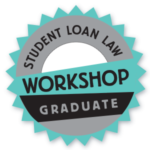
Student loan debt in this country has surpassed credit card debt and is second only to mortgages as consumer’s largest source of debt.
For many people, the thought of eliminating their student loan debt in bankruptcy has seemed impossible. However, a recent court ruling discharging a borrower’s student loan debt in bankruptcy has given hope that a new precedent will be established.
On January 7, 2020 a New York judge ruled that the $221,385.49 in student loan debt that U.S. Navy veteran Kevin Rosenberg owed for six years was considered a dischargeable debt in his Chapter 7 bankruptcy case.
Now not every case will achieve the same results but it looks better than it once did. Our law firm has been successful in getting rid of student loans in bankruptcies. Clients looking for an attorney that handles student loans in bankruptcies need to know that we do not just file a bankruptcy. We must file a lawsuit inside the Bankruptcy Estate. It is called an Adversary Complaint. This costs additional fees and there are no guarantees.
Bankruptcy courts view student loan debt differently from other types of consumer debt. To discharge student loan debt in bankruptcy, one must meet a standard known as “undue hardship,” which requires the filer prove the following:
- That repayment of the student loan debt is virtually impossible, based upon a “minimal” standard of living;
- That “additional circumstances” will make repaying the student loans just as difficult in the future as it is in the present;
- A good faith effort has been made to repay the student loan debt.
While the standard of undue hardship is difficult to prove, a lawsuit within a bankruptcy case called an adversary proceeding can be filed to establish necessary proof. At the very least, a partial discharge based on the principle of undue hardship can eliminate a portion of a filer’s student loan debt. In some circumstances, the entire student loan debt balance can be canceled or discharged, for example if the filer has suffered a permanent disability.
So many of our clients struggle with their monthly student loan payments. My firm has successfully wiped out more than $200,000.00 in student loan debt for our clients in bankruptcy- and we can do the same for you! Call the Benenati Law Firm today at (407) 777-7777 for a free consultation or fill out the below form to be contacted by one of our experienced student loan debt bankruptcy lawyers. Because Life Has a Reset Button.
Student Loan Help
Consider completing a quick, low cost, student loan evaluation to understand payment options, potential forgiveness, and next steps. Repayment options may free you from high student loan payments allowing pursuit of other life goals.
Get Relief From Your Student Loans
Fill out the form below and our office will contact you to discuss your options
Where do I find my federal student loan information?
That is a question our clients often ask us, and fortunately it can be found online quickly and easily without any charge. The National Student Loan Data System or “NSLDS” is the U.S. Department of Education’s database for federal student aid. Participating schools, agencies that insure or guaranty federal student loans, and federal student loan lenders provide information to NSLDS for access by authorized participants and borrowers.[1] You may obtain a report of your federal student loans by creating an account and logging in at https://studentaid.gov/. Once you have logged into your account, you just click on the “My Aid” tab to obtain your NSLDS report.
What if I have private or state-level student aid?
Many of our clients are unsure where their student loans came from- private or federal? You should note that the NSLDS only includes federal student loan information. If you received private student loans or state-level student aid, such information would not be accessible through the NSLDS. If you think you may have student loans that are not federal, it is recommended that you check your credit report for lender or servicer information or contact the educational institution at which you received the non-federal aid to obtain the pertinent information for your non-federal student aid. Note: Some student loan servicers handle both federal and private student loans. Therefore, it may not be possible to determine the type of student loans you have just by the name of your loan servicer.
Why access the NSLDS?
The NSLDS should be your starting point for gathering important information regarding your federal student loan information. The NSLDS will provide us with the information we need to make sure that your loans remain in good standing and that you obtain the best repayment or forgiveness option available. Your NSLDS report will include: (1) type of each loan, (2) the date and original amount of the loans, (3) your current principal and interest balance, (4) your interest rate, (5) your current payment plan, (6) your lender and loan servicer, and (7) your loan repayment start date, as well as forbearance, deferment, and default dates, if applicable.
If I received a loan from a bank, could it appear on the NSLDS?
Yes, private lending institutions granted federally backed student loans until 2010 under the Family Federal Education Loan (FFEL) program. If you received an FFEL loan, it would appear in your NSLDS report.
[1] https://nsldsfap.ed.gov/nslds_SA/public/SaFaqDetail.do?faqpage=faq1; see 20 U.S. Code § 1092(b).
Free Initial Consultation
In order to help you more quickly, please fill out the quick contact form. A representative of the firm will contact you to set up a FREE consultation.
We try to make our hours convenient for our hard-working clients by conducting FREE consultations on Saturdays (9-3) and during the week all the way to 5:00 p.m.




